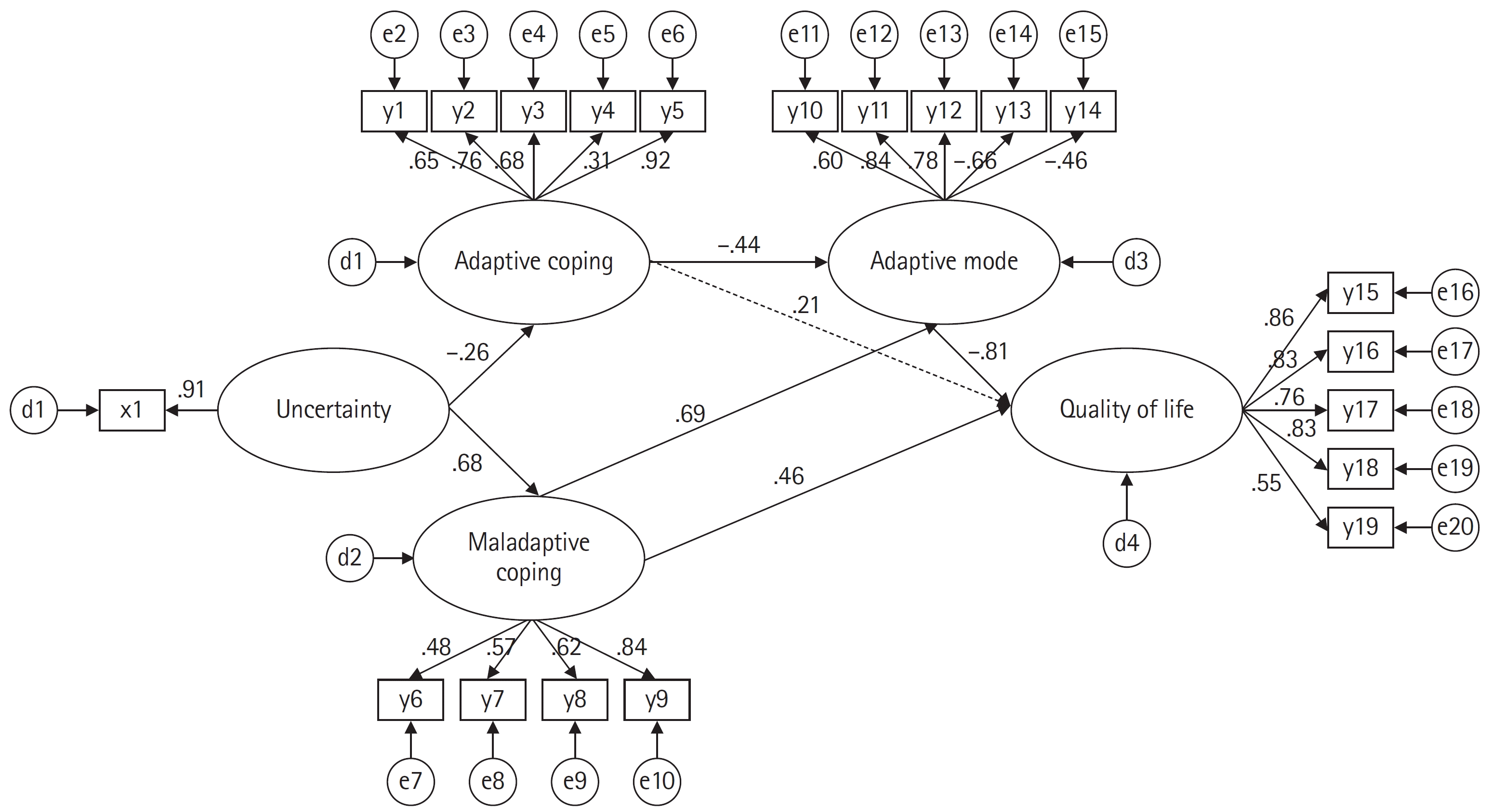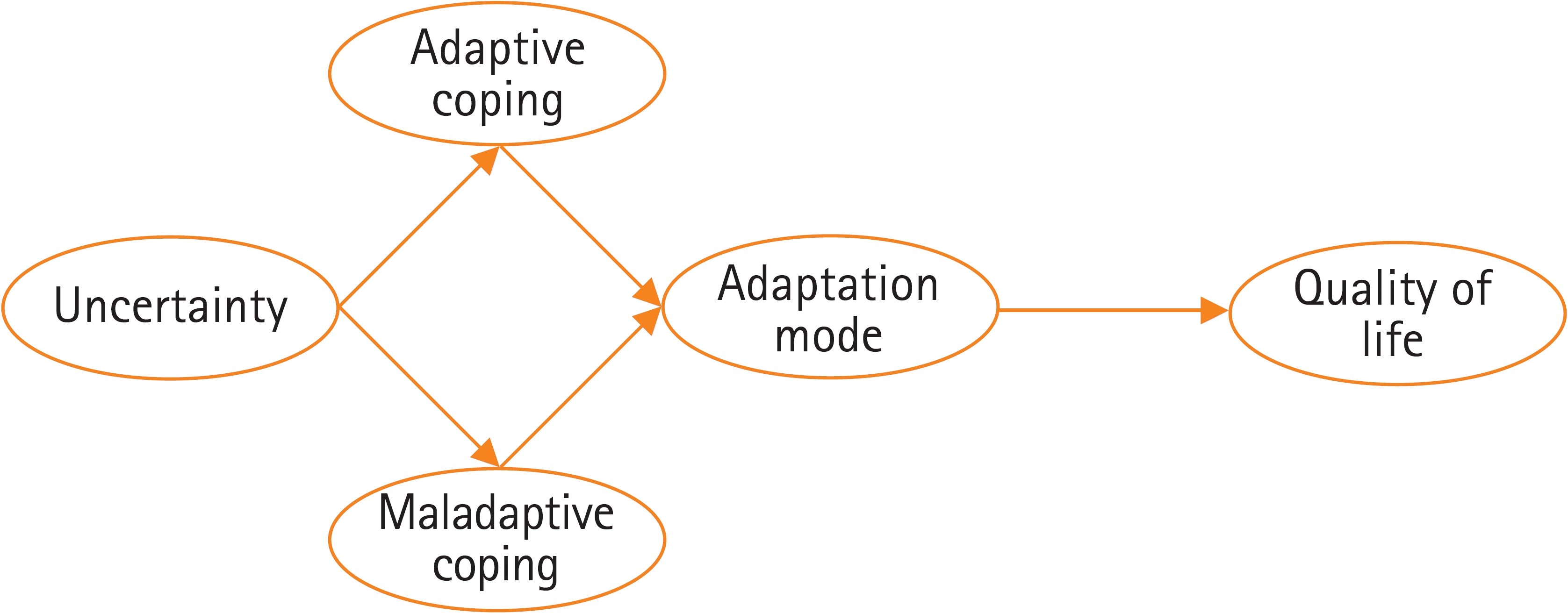2. Lancaster EE, Lapato DM, Jackson-Cook C, Strauss JF 3rd, Roberson-Nay R, York TP. Maternal biological age assessed in early pregnancy is associated with gestational age at birth. Sci Rep. 2021; 11(1):15440.
https://doi.org/10.1038/s41598-021-94281-7.

7. Kim EM, Hong S. Impact of uncertainty on the anxiety of hospitalized pregnant women diagnosed with preterm labor: focusing on mediating effect of uncertainty appraisal and coping style. J Korean Acad Nurs. 2018; 48(4):485–496.
https://doi.org/10.4040/jkan.2018.48.4.485.

10. Naseiri S, Askarizadeh G, Masoud Fazilat FP. The role of cognitive regulation strategies of emotion, psychological hardiness and optimism in the prediction of death anxiety of women in their third trimester of pregnancy. Iran J Psychiatr Nurs. 2017; 4(6):50–58.
https://doi.org/10.21859/ijpn-04068.

11. Jirapaet V. Effects of an empowerment program on coping, quality of life, and the maternal role adaptation of Thai HIV-infected mothers. J Assoc Nurses AIDS Care. 2000; 11(4):34–45.
https://doi.org/10.1016/S1055-3290(06)60394-4.

12. Gadelha IP, Aquino PS, Balsells MM, Diniz FF, Pinheiro AK, Ribeiro SG, et al. Quality of life of high risk pregnant women during prenatal care. Rev Bras Enferm. 2020; 73 Suppl 5:e20190595.
https://doi.org/10.1590/0034-7167-2019-0595.

13. Marchetti D, Carrozzino D, Fraticelli F, Fulcheri M, Vitacolonna E. Quality of life in women with gestational diabetes mellitus: a systematic review. J Diabetes Res. 2017; 2017:7058082.
https://doi.org/10.1155/2017/7058082.

14. Kang H, Nho JH, Kang H, Lee S, Lee H, Choi S. Influence of fatigue, depression and anxiety on quality of life in pregnant women with preterm labor. Korean J Women Health Nurs. 2016; 22(4):254–263.
https://doi.org/10.4069/kjwhn.2016.22.4.254.

15. Morin M, Claris O, Dussart C, Frelat A, de Place A, Molinier L, et al. Health-related quality of life during pregnancy: a repeated measures study of changes from the first trimester to birth. Acta Obstet Gynecol Scand. 2019; 98(10):1282–1291.
https://doi.org/10.1111/aogs.13624.

17. Roy C, Andrews HA. The Roy adaptation model. 2nd ed. Stamford (CT): Appleton & Lange;1999. p. 574.
18. Amanak K, Sevil U, Karacam Z. The impact of prenatal education based on the Roy adaptation model on gestational hypertension, adaptation to pregnancy and pregnancy outcomes. J Pak Med Assoc. 2019; 69(1):11–17.
19. Widiasih R, Trisyani M, Maryati I, Hermayanti Y. Nursing care of premature rupture of membranes in pregnancy: Roy adaptation model. J Matern Care Reprod Health. 2018; 1(1):87–99.
https://doi.org/10.36780/jmcrh.v1i1.18.

23. Abrar A, Fairbrother N, Smith AP, Skoll A, Albert AYK. Anxiety among women experiencing medically complicated pregnancy: a systematic review and meta-analysis. Birth. 2020; 47(1):13–20.
https://doi.org/10.1111/birt.12443.

24. Lindegren ML, Kennedy CE, Bain-Brickley D, Azman H, Creanga AA, Butler LM, et al. Integration of HIV/AIDS services with maternal, neonatal and child health, nutrition, and family planning services. Cochrane Database Syst Rev. 2012; (9):CD010119.
https://doi.org/10.1002/14651858.CD010119.

26. Shin GG. Amos 23 statistical analysis follow-up. 2nd ed. Seoul: Chungram Books;2016. p. 491.
27. Dadi AF, Miller ER, Woodman R, Bisetegn TA, Mwanri L. Antenatal depression and its potential causal mechanisms among pregnant mothers in Gondar town: application of structural equation model. BMC Pregnancy Childbirth. 2020; 20(1):168.
https://doi.org/10.1186/s12884-020-02859-2.

29. Choi SY, Gu HJ, Ryu EJ. Effects of fatigue and postpartum depression on maternal perceived quality of life (MAPP-QOL) in early postpartum mothers. Korean J Women Health Nurs. 2011; 17(2):118–125.
https://doi.org/10.4069/kjwhn.2011.17.2.118.

30. Mishel MH, Clayton MF. Theories of uncertainty in illness. In : Smith MJ, Liehr PR, editors. Middle range theory of nursing. 2nd ed. New York: Springer Publishing Company;2008. p. 55–84.
31. Chung C, Kim MJ, Rhee MH, Do HG. Functional status and psychosocial adjustment in gynecologic cancer patients receiving chemotherapy. Korean J Women Health Nurs. 2005; 11(1):58–66.
https://doi.org/10.4069/kjwhn.2005.11.1.58.

32. Kim SH. A study on relationships among the stressful events, cognitive emotion regulation strategies and psychological well-being [master’s thesis]. Seoul: The Catholic University of Korea;2004. 61.
33. Garnefski N, Legerstee J, Kraaij VV, Van Den Kommer T, Teerds J. Cognitive coping strategies and symptoms of depression and anxiety: a comparison between adolescents and adults. J Adolesc. 2002; 25(6):603–611.
https://doi.org/10.1006/jado.2002.0507.

34. Milligan R, Lenz ER, Parks PL, Pugh LC, Kitzman H. Postpartum fatigue: clarifying a concept. Sch Inq Nurs Pract. 1996; 10(3):279–291.
35. Song JE. A structural model of postpartum fatigue of the primipara in Korea [dissertation]. Seoul: Yonsei University;2007. 134.
36. Spielberger CD, Gonzalez-Reigosa F, Martinez-Urrutia A, Natalicio LF, Natalicio DS. The state-trait anxiety inventory. Interam J Psychol. 1971; 5(3 & 4):145–158.
37. Kim J, Shin D. A study based on the standardization of the STAI for Korea. New Med J. 1978; 21(11):69–75.
38. Kim YK, Hur JW, Kim KH, Oh KS, Shin YC. Clinical application of Korean version of Edinburgh Postnatal Depression Scale. J Korean Neuropsychiatr Assoc. 2008; 47(1):36–44.
39. Cox JL, Holden JM, Sagovsky R. Detection of postnatal depression. Development of the 10-item Edinburgh Postnatal Depression Scale. Br J Psychiatry. 1987; 150:782–786.
https://doi.org/10.1192/bjp.150.6.782.

41. Cho H, Choi SM, Oh HJ, Kwon JH. Validity of the short forms of the Korean Dyadic Adjustment Scale. Korean J Couns Psychother. 2011; 23(3):655–670.
42. Spanier GB. Measuring dyadic adjustment: new scales for assessing the quality of marriage and similar dyads. J Marriage Fam. 1976; 38(1):15–28.
https://doi.org/10.2307/350547.

43. Pahlevan Sharif S, Ahadzadeh AS, Perdamen HK. Uncertainty and quality of life of Malaysian women with breast cancer: mediating role of coping styles and mood states. Appl Nurs Res. 2017; 38:88–94.
https://doi.org/10.1016/j.apnr.2017.09.012.

44. Kang DI, Park E. Do taegyo practices, self-esteem, and social support affect maternal-fetal attachment in high-risk pregnant women? A cross-sectional survey. Korean J Women Health Nurs. 2022; 28(4):338–347.
https://doi.org/10.4069/kjwhn.2022.12.16.

45. Yoo SM. Pregnancy stress and maternal-fetal attachment among high-risk pregnant women with different coping strategies [master’s thesis]. Busan: Pusan National University;2021. 61.
47. Jeong YJ, Nho JH, Kim HY, Kim JY. Factors influencing quality of life in early postpartum women. Int J Environ Res Public Health. 2021; 18(6):2988.
https://doi.org/10.3390/ijerph18062988.

48. Lagadec N, Steinecker M, Kapassi A, Magnier AM, Chastang J, Robert S, et al. Factors influencing the quality of life of pregnant women: a systematic review. BMC Pregnancy Childbirth. 2018; 18(1):455.
https://doi.org/10.1186/s12884-018-2087-4.

49. Park HJ. Factors affecting quality of life in pregnant women [master’s thesis]. Seoul: Korea University;2021. 89.
50. Kim HJ, Chun N. Effects of a supportive program on uncertainty, anxiety, and maternal-fetal attachment in women with high-risk pregnancy. Korean J Women Health Nurs. 2020; 26(2):180–190.
https://doi.org/10.4069/kjwhn.2020.06.17.

51. Williamson SP, Moffitt RL, Broadbent J, Neumann DL, Hamblin PS. Coping, wellbeing, and psychopathology during high-risk pregnancy: a systematic review. Midwifery. 2023; 116:103556.
https://doi.org/10.1016/j.midw.2022.103556.

52. Chung MY, Hwang KH, Cho OH. Relationship between fatigue, sleep disturbance, and gestational stress among pregnant women in the late stages. Korean J Women Health Nurs. 2014; 20(3):195–203.
https://doi.org/10.4069/kjwhn.2014.20.3.195.

53. Schubert KO, Air T, Clark SR, Grzeskowiak LE, Miller E, Dekker GA, et al. Trajectories of anxiety and health related quality of life during pregnancy. PLoS One. 2017; 12(7):e0181149.
https://doi.org/10.1371/journal.pone.0181149.

54. Koh M, Kim J, Yoo H, Kim SA, Ahn S. Development and application of a couple-centered antenatal education program in Korea. Korean J Women Health Nurs. 2021; 27(2):141–152.
https://doi.org/10.4069/kjwhn.2021.06.20.

55. Seo HJ, Song JE, Lee Y, Ahn JA. Effects of stress, depression, and spousal and familial support on maternal identity in pregnant women. Korean J Women Health Nurs. 2020; 26(1):84–92.
https://doi.org/10.4069/kjwhn.2020.03.17.

56. Lee SM, Park HJ. Relationship among emotional clarity, maternal identity, and fetal attachment in pregnant women with gestational diabetes mellitus. Korean J Women Health Nurs. 2017; 23(2):99–108.
https://doi.org/10.4069/kjwhn.2017.23.2.99.

57. Oh YK, Hwang SY. Impact of uncertainty on the quality of life of young breast cancer patients: focusing on mediating effect of marital intimacy. J Korean Acad Nurs. 2018; 48(1):50–58.
https://doi.org/10.4040/jkan.2018.48.1.50.






 PDF
PDF Citation
Citation Print
Print





 XML Download
XML Download